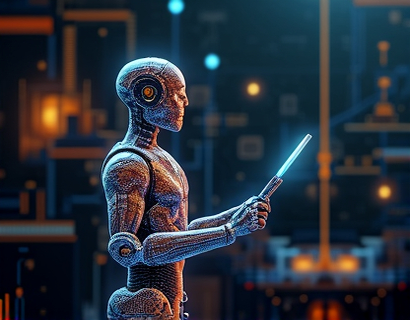Transforming Digital App Ecosystems: The Synergy of Crypto and AI
The integration of cryptocurrency and artificial intelligence is revolutionizing the digital app ecosystem, offering unprecedented levels of efficiency, security, and user experience. This transformative fusion is not just a technological advancement but a paradigm shift in how we interact with digital services. As we delve into this topic, it's essential to understand the foundational technologies driving this change and their practical applications.
Foundations of Cryptocurrency and AI
Cryptocurrency, built on blockchain technology, provides a decentralized and secure method for transactions. Blockchain's inherent transparency and immutability make it an ideal foundation for trustless systems. On the other hand, artificial intelligence leverages complex algorithms and machine learning to simulate human intelligence, enabling systems to learn from data, recognize patterns, and make decisions with minimal human intervention.
The convergence of these two technologies creates a powerful synergy. Blockchain's security and transparency complement AI's ability to process and analyze vast amounts of data, leading to more robust and secure digital applications. This combination is reshaping various sectors, from finance and healthcare to supply chain and beyond.
Enhanced Security through Crypto and AI
One of the most significant benefits of integrating cryptocurrency and AI is the enhancement of security measures in digital applications. AI can detect and respond to threats in real-time, identifying anomalies and potential security breaches that traditional systems might miss. For instance, machine learning algorithms can analyze user behavior patterns to flag suspicious activities, thereby strengthening the security posture of apps and services.
Moreover, smart contracts on blockchain platforms can automate and enforce contractual obligations with precision, reducing the risk of fraud and errors. The immutable nature of blockchain ensures that once a transaction is recorded, it cannot be altered, providing a high level of trust and security. This is particularly crucial in industries handling sensitive data, such as finance and healthcare.
Improved User Authentication and Identity Management
User authentication and identity management are critical components of any digital ecosystem. The combination of cryptocurrency and AI offers advanced solutions in this area. Biometric data, such as facial recognition and fingerprint scans, can be securely stored and verified using blockchain technology. AI algorithms can enhance the accuracy and reliability of these biometric systems, reducing false positives and negatives.
Decentralized identity (DID) frameworks leverage blockchain to give users control over their personal data. AI can manage and verify identities in a seamless and secure manner, ensuring that only authorized users access specific services. This not only improves user experience but also complies with stringent data protection regulations like GDPR.
Optimized Data Processing and Analytics
AI's strength lies in its ability to process and analyze large datasets quickly and accurately. When combined with the transparent and secure data storage capabilities of blockchain, the potential for optimized data processing and analytics becomes immense. AI can extract valuable insights from blockchain data, helping businesses make data-driven decisions and improve operational efficiency.
For example, in supply chain management, AI can analyze transaction data on the blockchain to track the movement of goods in real-time, predict delays, and optimize logistics. This level of insight and control was previously unattainable, leading to significant improvements in supply chain transparency and efficiency.
Decentralized Finance (DeFi) and AI-Driven Financial Services
Decentralized finance (DeFi) is a prime example of how cryptocurrency and AI are transforming the financial sector. DeFi platforms use blockchain to provide financial services without intermediaries, offering greater accessibility and lower costs. AI enhances these platforms by providing sophisticated risk assessment tools, automated trading algorithms, and personalized financial advice.
AI-driven bots can execute trades based on predefined criteria, adapting to market conditions in real-time. This not only increases the efficiency of trading but also reduces human error. Additionally, AI can analyze vast amounts of financial data to identify trends and predict market movements, giving users a competitive edge.
Enhanced Customer Experience through Personalization
Personalization is key to enhancing user experience in digital applications. AI algorithms can analyze user behavior and preferences to deliver tailored content and recommendations. When integrated with blockchain, this personalization can be done securely and transparently, ensuring user data is protected and users have control over their information.
For instance, in e-commerce platforms, AI can suggest products based on a user's browsing and purchase history, while blockchain ensures that the user's data is securely stored and managed. This combination leads to a more satisfying and trustworthy user experience, fostering customer loyalty and engagement.
Challenges and Considerations
Despite the numerous benefits, the integration of cryptocurrency and AI in digital app ecosystems comes with its own set of challenges. One major concern is the regulatory landscape. As these technologies evolve, regulatory bodies are still grappling with how to oversee and govern them. Compliance with varying regulations across different regions can be complex and time-consuming.
Another challenge is the technical complexity involved in implementing and maintaining these systems. Developers need a deep understanding of both blockchain and AI to create robust and secure applications. This requires a skilled workforce, which is currently in short supply.
Furthermore, there are concerns about the environmental impact of blockchain, particularly proof-of-work (PoW) systems, which consume significant amounts of energy. The industry is moving towards more sustainable consensus mechanisms, but this transition takes time.
Future Prospects and Innovations
The future of cryptocurrency and AI in digital app ecosystems looks promising. As technology advances, we can expect more innovative solutions that further enhance security, efficiency, and user experience. One area of focus is the development of interoperable blockchain networks, allowing different blockchain systems to communicate and transact with each other seamlessly. This interoperability, combined with AI, can create a more connected and efficient digital world.
Another exciting development is the integration of AI with the Internet of Things (IoT). Smart devices can leverage AI to process and act on data from blockchain-based sensors and devices, creating a smarter and more automated environment. This convergence has the potential to revolutionize industries such as smart cities, healthcare, and smart homes.
Additionally, the rise of non-fungible tokens (NFTs) and decentralized autonomous organizations (DAOs) showcases the creative possibilities at the intersection of cryptocurrency and AI. NFTs, secured by blockchain, can represent unique digital assets, while DAOs use AI to manage and govern decentralized communities, ensuring fair and transparent decision-making processes.
Conclusion
The fusion of cryptocurrency and AI is transforming digital app ecosystems in profound ways, offering enhanced security, personalized user experiences, and optimized data processing. While challenges remain, the potential benefits are vast and far-reaching. As technology continues to evolve, the synergy between these two fields will undoubtedly lead to new innovations and applications that redefine the digital landscape. For tech enthusiasts and professionals, staying informed and adaptable to these changes is crucial for harnessing the full potential of this exciting frontier.











































